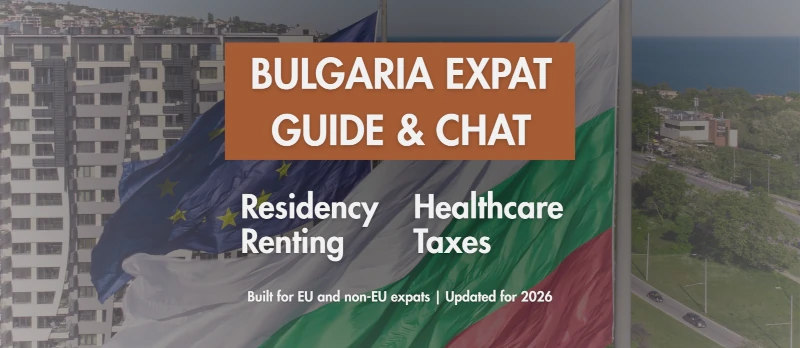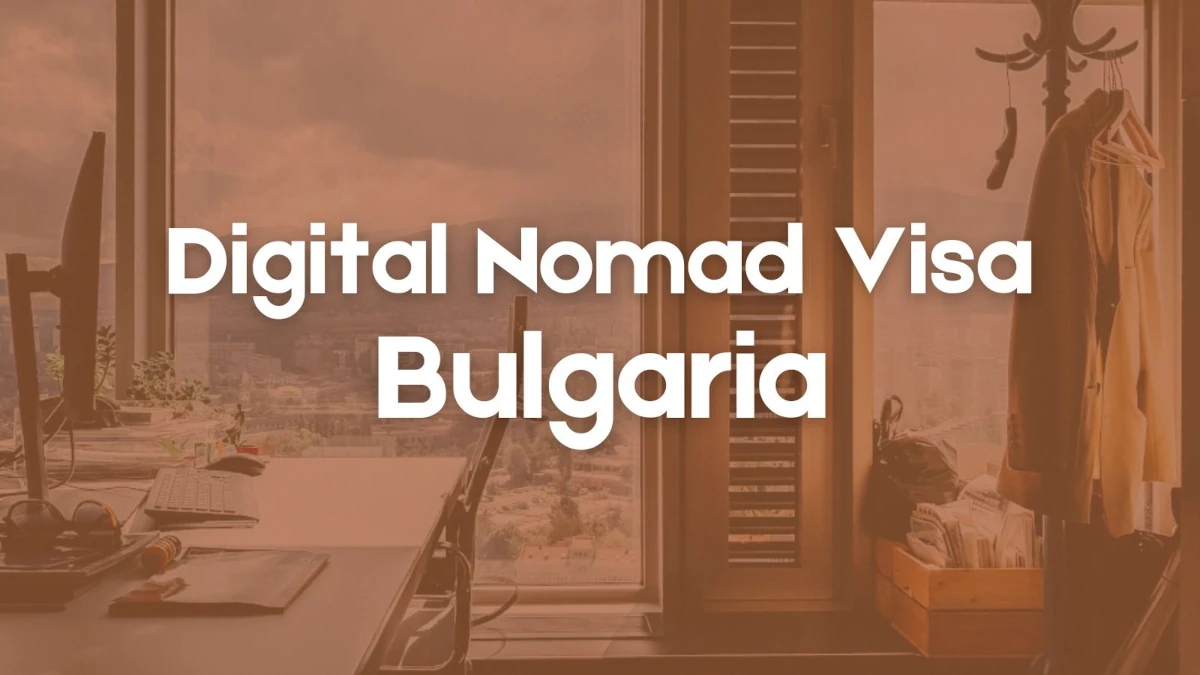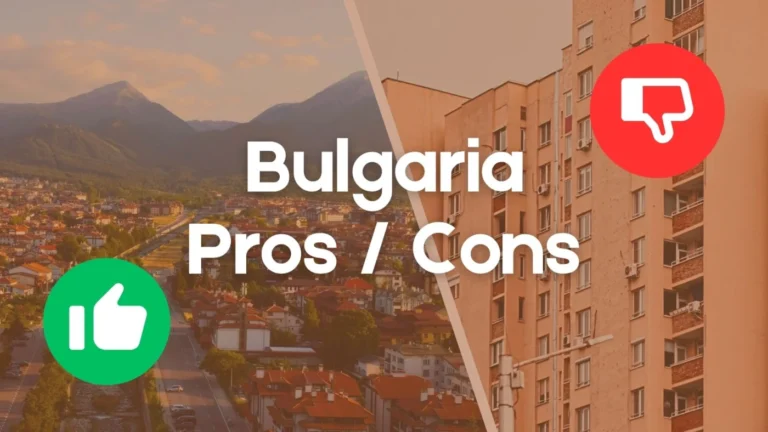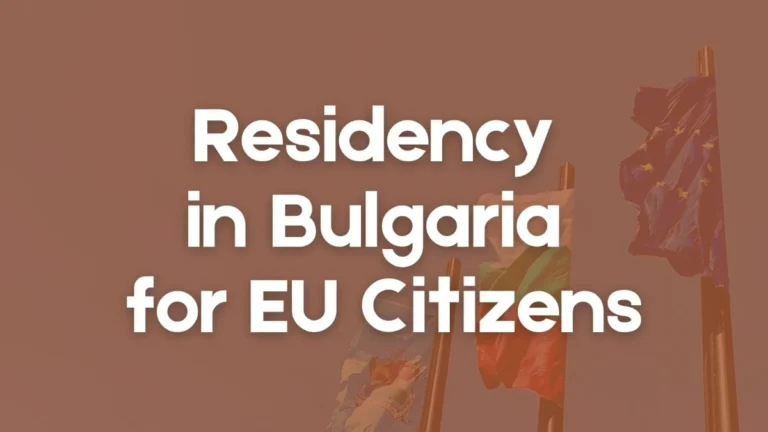By 2026, many countries have introduced special digital nomad visas to attract remote workers. Bulgaria is often mentioned as a promising destination for freelancers and remote professionals due to its low cost of living and favorable tax regime.
Looking for how to move to Bulgaria as a Remote Worker or an Entrepreneur? I’ve helped other foreigners through this process.
→ Download my FREE Bulgarian Residency Checklist (includes options for EU and non-EU citizens)
→ Or let me help you with getting a Residence Permit in Bulgaria
Digital Nomad Visa: Does Bulgaria Have it?
In 2026, a new category is introduced in Bulgaria Foreigners Act: Digital Nomad.
A digital nomad is a foreigner who meets one of the following conditions:
- Employee of a foreign employer
- Employed under an employment contract
- Employer is registered outside the EU / EEA / Switzerland
- Work is performed remotely via information technologies
- If the contract is fixed-term, its remaining duration must be at least as long as the residence permit
- Owner / manager / shareholder of a foreign company
- Owns more than 25% of a company registered outside the EU / EEA / Switzerland
- Provides remote services via IT
- Does NOT work for or provide services to persons in Bulgaria
- Independent remote worker (self-employed abroad)
- Has been providing remote services personally via IT
- For at least one year before applying
- Does NOT perform work or provide services in Bulgaria
- Does NOT practice freelance activity in Bulgaria
However, at this stage, it remains unclear whether digital nomads will be required to apply for a Visa D, as well as what the exact income thresholds, document list, and submission procedure will be.
The current Law on Foreigners in the Republic of Bulgaria introduces the concept of a digital nomad but does notprovide detailed implementation rules. There are no specific provisions in the law that clarify income requirements, practical documentation standards, or the exact application workflow.
While some information is already circulating online, it is largely based on media publications and secondary interpretations rather than binding legal acts or official instructions. As such, this information cannot be relied upon as established law and should be treated only as assumptions.
Official clarification is expected through additional instructions or practice guidelines from the Migration Directorate, likely during 2026. Until then, no definitive procedural framework exists.
What Are the Other Residency Options for Digital Nomads/Freelancers in Bulgaria?
For EU Citizens
- EU citizens enjoy visa-free entry and freedom of movement within Bulgaria.
- If staying longer than 90 days, EU nationals must register with the Bulgarian Migration Office and obtain a residence certificate.
- The process is straightforward, requiring proof of income or employment, health insurance, and accommodation.
- No visa or work permit is needed, making Bulgaria one of the easiest EU countries for digital nomads from the EU to settle in.
Looking for how to move to Bulgaria as an EU Citizen? I’ve helped other foreigners through this process.
→ Download my FREE Bulgarian Residency Checklist (includes documents needed for EU citizens)
→ Get the Bulgaria Relocation Guide + Expat Q&A Chat (Lifetime Access)
→ Or let me help you with getting a Residence Permit in Bulgaria
For Non-EU Citizens with Independent Income (2026)
Alongside Digital Nomad Visa, Bulgaria offers several legal pathways for non-EU citizens with independent income to obtain residency. Each route has its own requirements, features, and benefits.
Trade Representative Office (TRO) Program
Overview:
The TRO program is the most popular and practical route for non-EU freelancers and entrepreneurs. It allows a foreign company to establish a non-commercial representative office in Bulgaria and appoint a trade representative who can obtain residency.
Key Features:
- No Bulgarian language requirement.
- No minimum investment or local hiring required.
- You can continue running your foreign business remotely.

Stuck in research mode?
Where to live?
Which documents do you need?
Do you register as a freelancer or as a company?
How to pay taxes?
Is Bulgaria even the right choice for you?
I’ve been there.
That’s why I created this Chat & Guide — so you don’t have to spend weeks in research mode, guessing your way through bureaucracy, or worrying about mistakes that could cost you time and money.
Requirements:
- The foreign company must be operational (at least for 2 years).
- Registration of the representative office with the Bulgarian Chamber of Commerce and Industry (BCCI).
- 2026 Update: Annual turnover of at least 50 000 EUR (or equivalent in foreign currency, calculated by the Bulgarian National Bank rate on the day the registration documents are accepted by the Bulgarian Chamber of Commerce and Industry)
- Appointment letter for the trade representative.
- Proof of financial means, health insurance, clean criminal record, and accommodation in Bulgaria.
Advantages:
- Fast, streamlined route to residency.
- Pathway to permanent residency and EU long-term residence.
- Family reunification options.
Looking for how to move to Bulgaria as a Remote Worker or an Entrepreneur? I’ve helped other foreigners through this process.
→ Download my FREE Bulgarian Residency Checklist (includes options for EU and non-EU citizens)
→ Or let me help you with getting a Residence Permit in Bulgaria
Freelance (Self-Employed) Residence Permit
Overview:
Bulgaria allows non-EU citizens to obtain a residence permit as a self-employed freelancer, but this route is less common due to bureaucratic hurdles and language requirements.
Key Features:
- Requires a permit from the Ministry of Labor and Social Policy.
- Bulgarian language proficiency at B1 level is mandatory for most applicants.
- Suitable for those who can demonstrate a viable freelance business plan and professional qualifications.
Requirements:
- Type D visa application with supporting documents (proof of freelance income, business plan, qualifications).
- Approval from the Bulgarian Employment Agency.
- Health insurance, clean criminal record, and accommodation in Bulgaria.
Challenges:
- Language requirement is a significant barrier.
- Process is bureaucratic and less frequently used by digital nomads.
Residency by Investment
Overview:
Non-EU citizens can obtain permanent residency by making a qualifying investment in Bulgaria, such as investing in Bulgarian Alternative Investment Funds (AIFs) or Exchange-Traded Funds (ETFs).
Key Features:
- Minimum investment: €512,000 (about BGN 1 million).
- No language requirement.
- Direct path to permanent residency, with citizenship eligibility after maintaining the investment for five years.
Requirements:
- Complete due diligence and obtain pre-approval from the Bulgarian Investment Agency.
- Apply for a Type D visa.
- Make the investment and submit the permanent residency application.
Other Options
- Employment-Based Residency: Requires a job offer and work permit from a Bulgarian employer.
- Retirement Residency: For those with stable pension income.
- Family Reunification: For family members of Bulgarian residents or citizens.
Looking for how to move to Bulgaria as a Remote Worker or an Entrepreneur? I’ve helped other foreigners through this process.
→ Download my FREE Bulgarian Residency Checklist (includes options for EU and non-EU citizens)
→ Or let me help you with getting a Residence Permit in Bulgaria
Summary Table
| Route | Language Requirement | Investment Required | Main Barrier | Path to Permanent Residency |
|---|---|---|---|---|
| Trade Representative Office | None | No | Must have foreign company | Yes, after 5 years |
| Freelance Permit | B1 Bulgarian | No | Language & bureaucracy | Yes, after 5 years |
| Investment | None | Yes (€512,000+) | High capital needed | Yes, direct |
| Employment | None | No | Job offer & work permit | Yes, after 5 years |
| Retirement | None | No | Proof of pension income | Yes, after 5 years |
What’s the best Residency Option in Bulgaria for Non-EU Citizens?
For non-EU citizens with independent income, the Trade Representative Office (TRO) program is the most common and accessible route to Bulgarian residency, avoiding language barriers and offering a clear path to permanent residency.
The freelance permit route to get Residency in Bulgaria for non-EU Freelancers and Digital Nomads is possible but less practical due to language and bureaucratic requirements. Investment-based residency is available for those with significant capital. All routes ultimately provide access to Bulgaria’s low cost of living, flat 10% income tax, and the benefits of EU residency.
Residency Process for EU Citizens vs. Non-EU Freelancers
| Aspect | EU Citizens | Non-EU Freelancers |
|---|---|---|
| Visa Requirement | None for stays ≤90 days; residence registration >90 days | Type D visa + TRO registration or freelance permit |
| Language Requirement | None | B1 Bulgarian for freelance permit; none for TRO |
| Bureaucracy Level | Low | Moderate to high for freelance permit; moderate for TRO |
| Income Requirement | Proof of stable income or employment | Proof of stable freelance income or foreign company backing |
| Residency Duration | Unlimited with registration | 1 year, renewable |
| Tax Rate | Flat 10% personal income tax | Flat 10% personal income tax |
Why Move to Bulgaria as a Digital Nomad, Freelancer or Entrepreneur?
What are the key benefits of moving to Bulgaria for Digital Nomads, Freelancers and Entrepreneurs with location independent Income?
- Bulgaria offers a flat 10% income tax rate, one of the lowest in the EU, attractive for freelancers and digital nomads.
- The cost of living is low, with monthly expenses around $800–$1,200 for a comfortable lifestyle.
- EU citizens enjoy simple residency registration without visas.
- Non-EU freelancers face a choice between the complex freelance permit (with language and business plan requirements) or the more practical TRO route.
- The TRO route is currently the most realistic and popular method for non-EU freelancers to live and work remotely in Bulgaria legally.
Read More:
Living in Bulgaria as an Expat: Honest Pros and Cons After One Year in Sofia
Bulgaria did not offer a standalone digital nomad visa for years. Remote workers used existing residence routes instead. EU citizens can enter freely and register residence after 90 days. Non-EU citizens must apply for a Type D visa and a residence permit under a legally defined ground.
In 2025, Bulgarian parliament approved the introduction of a digital nomad residence category. Approval alone does not define how applications are processed. What matters is the final legal text and its implementation by migration authorities. Until practice becomes clear and predictable, non-EU remote workers continue to rely on established options, most commonly the Trade Representative Office (TRO) route.
Looking for how to move to Bulgaria as a Remote Worker or an Entrepreneur? I’ve helped other foreigners through this process.
→ Download my FREE Bulgarian Residency Checklist (includes options for EU and non-EU citizens)
→ Or let me help you with getting a Residence Permit in Bulgaria








